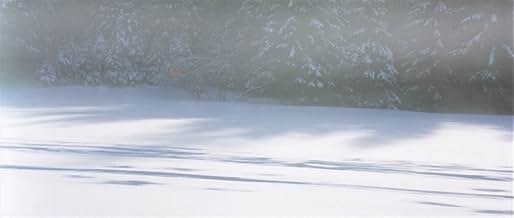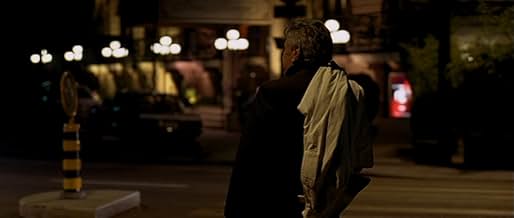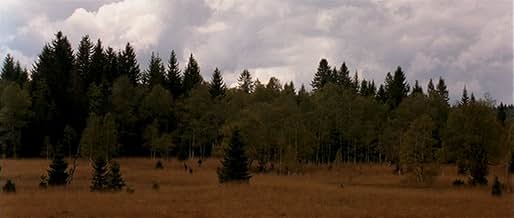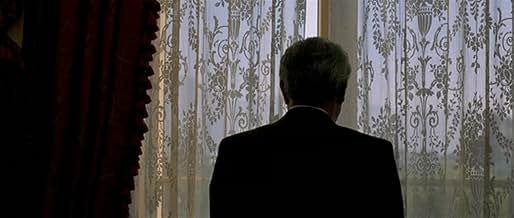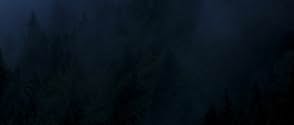IMDb-BEWERTUNG
6,6/10
2252
IHRE BEWERTUNG
Füge eine Handlung in deiner Sprache hinzuAn emotionally cold man leaves the safety of his Alpine home to seek a heart transplant and an estranged son.An emotionally cold man leaves the safety of his Alpine home to seek a heart transplant and an estranged son.An emotionally cold man leaves the safety of his Alpine home to seek a heart transplant and an estranged son.
- Regie
- Drehbuch
- Hauptbesetzung
- Auszeichnungen
- 4 Nominierungen insgesamt
Yekaterina Golubeva
- La jeune femme russe
- (as Katia Golubeva)
Florence Loiret Caille
- Antoinette
- (as Florence Loiret-Caille)
Empfohlene Bewertungen
First of all, I liked very much the central idea of locating the '' intruders'', Others in the fragile Self, on various levels - mainly subconscious but sometimes more allegorical. In fact the intruders are omnipresent throughout the film : in the Swiss-French border where the pretagonist leads secluded life; in the his recurring daydream and nightmare; inside his ailing body after heart transplantation.... In the last half of the film, he becomes intruder himself, returning in ancient french colony in the hope of atoning for the past.
The overall tone is bitter rather than pathetic, full of regrets and guilts, sense of failure being more or less dominant. This is a quite grim picture of an old age, ostensibly self-dependent but hopelessly void and lonely inside. The directer composes the images more to convey passing sensations of anxiety and desire than any explicit meanings. Some of them are mesmerizing, not devoid of humor though, kind of absurdist play only somnambulist can visualize.
The overall tone is bitter rather than pathetic, full of regrets and guilts, sense of failure being more or less dominant. This is a quite grim picture of an old age, ostensibly self-dependent but hopelessly void and lonely inside. The directer composes the images more to convey passing sensations of anxiety and desire than any explicit meanings. Some of them are mesmerizing, not devoid of humor though, kind of absurdist play only somnambulist can visualize.
Two things haunt you throughout L'intrus (The Intruder): who's the intruder and is it a movie or a dream you're watching? The ending is so shocking that for a while you're at a loss for an answer to either of those questions. The intruder pops up as different characters, different men in different circumstances who don't belong in the scene, so they're expelled from it, kindly or brutally, but often without emotional involvement. The main character, Louis, is a contemptible man. He's got rough ways, some mean job and no heart. He needs one and goes after it. He has a heart transplanted and afterwards decides to start a new life. Can this man succeed in his quest for redemption? A guy like that could cut your throat at the drop of a hat. You know it but Claire Denis doesn't encourage you to judge him. Occasionally, there's a young Russian woman -a beautiful girl who seems to inhabit someplace between heaven and earth - who does judge him. She may even punish him. But not Denis. There's the character played by Beatrice Dalle who wants no business with him: don't touch me, she says. But Denis lets this man be himself, films him in his self-absorbed quest. I don't know if what she films is the heart or the mind but it isn't the traditional plot basics. Whatever she films, you get it in the end. You know who's "the" intruder, you know why, more or less, and some scenes come back to your mind with their full meaning. But was it a movie or a dream?
"The Intruder (L'Intrus)" is a visual pilgrimage through a mysterious life.
Grizzled Michel Subor plays "Louis Trebor" like Jason Bourne as an old man with a hidden past, living simply in an isolated hut in the woods for justifiably paranoid reasons (but attracting pretty young women who can be useful to him). We learn more about him through dreams, flashbacks and a journey that may unfold chronologically or not, as well as through his brusque interactions with family, lovers, business associates and a striking nemesis. Like "The Limey," the film resonates with parent/child regrets and a suspicious past revealed through clips from an old film with the same actor as a young man (here Paul Gégauff's 1965 adventure film "Le Reflux").
In a complete contrast of moods, we meet his son Sidney (Grégoire Colin) who has to be the sexiest house husband in the world, as he sweetly and seductively does household repairs and cares for a baby, a toddler and every need of his working wife. Surely director/co-writer Claire Denis must have created him as a woman's fantasy if ever there was one and a lesson to other filmmakers on filming foreplay. There's an additional extended scene where he seeks his father in the woods while carefully carrying his angelic baby in a pouch. He is everything his father is not and has every relationship his father is incapable of sustaining; no wonder he thinks his father is "a lunatic." I spent the rest of the film in dread that something bad would happen to him as the true nature of the heart of his alienated father is very gradually played out before our eyes.
The film is a puzzle, but Subor is ruthlessly fascinating as we watch him traverse countries and negotiate nefarious deals, and the voice-over narration for Denis's "Beau Travail" was annoying anyway. We have to figure out from skylines and incidental signage that he is traveling to Geneva, Korea and the South Pacific. Time passing is indicated by the seasons changing and scars being created and healing. There are lots of images of water for cleansing and for distancing.
Continuing her fascination with the morphing of colonialism into globalization, as well as playing a bit on stereotypes of the Mysterious Orient and Russian criminals, Denis has incorporated elements from Robert Louis Stevenson, Paul Gauguin and Marlon Brando's Tahiti idylls and a 40-page memoir by French philosopher Jean-Luc Nancy, the last for the title and heart-transplant plot used for an ironic theme of limited immortality which does have consequences.
While "Louis" thinks he's succeeded in being above boundaries, rules and morals, there is some amusement in the last act as the locals don't quite know what to do with him and try to help him solve his quixotic odyssey, even as he again lies in isolation.
Several people in the audience left in frustration at the elliptical, but strikingly beautiful, story telling method. The unconventional narrative does raise a lot of plot questions on details.
Grizzled Michel Subor plays "Louis Trebor" like Jason Bourne as an old man with a hidden past, living simply in an isolated hut in the woods for justifiably paranoid reasons (but attracting pretty young women who can be useful to him). We learn more about him through dreams, flashbacks and a journey that may unfold chronologically or not, as well as through his brusque interactions with family, lovers, business associates and a striking nemesis. Like "The Limey," the film resonates with parent/child regrets and a suspicious past revealed through clips from an old film with the same actor as a young man (here Paul Gégauff's 1965 adventure film "Le Reflux").
In a complete contrast of moods, we meet his son Sidney (Grégoire Colin) who has to be the sexiest house husband in the world, as he sweetly and seductively does household repairs and cares for a baby, a toddler and every need of his working wife. Surely director/co-writer Claire Denis must have created him as a woman's fantasy if ever there was one and a lesson to other filmmakers on filming foreplay. There's an additional extended scene where he seeks his father in the woods while carefully carrying his angelic baby in a pouch. He is everything his father is not and has every relationship his father is incapable of sustaining; no wonder he thinks his father is "a lunatic." I spent the rest of the film in dread that something bad would happen to him as the true nature of the heart of his alienated father is very gradually played out before our eyes.
The film is a puzzle, but Subor is ruthlessly fascinating as we watch him traverse countries and negotiate nefarious deals, and the voice-over narration for Denis's "Beau Travail" was annoying anyway. We have to figure out from skylines and incidental signage that he is traveling to Geneva, Korea and the South Pacific. Time passing is indicated by the seasons changing and scars being created and healing. There are lots of images of water for cleansing and for distancing.
Continuing her fascination with the morphing of colonialism into globalization, as well as playing a bit on stereotypes of the Mysterious Orient and Russian criminals, Denis has incorporated elements from Robert Louis Stevenson, Paul Gauguin and Marlon Brando's Tahiti idylls and a 40-page memoir by French philosopher Jean-Luc Nancy, the last for the title and heart-transplant plot used for an ironic theme of limited immortality which does have consequences.
While "Louis" thinks he's succeeded in being above boundaries, rules and morals, there is some amusement in the last act as the locals don't quite know what to do with him and try to help him solve his quixotic odyssey, even as he again lies in isolation.
Several people in the audience left in frustration at the elliptical, but strikingly beautiful, story telling method. The unconventional narrative does raise a lot of plot questions on details.
Claire Denis has demonstrated repeatedly that film does not need to tell a story, that it is sufficient to create an experience that allows the viewer to take the ingredients and make of them what they will.
Ostensibly the idea within the framework of a most non-linear film is the older man living on the French-Swiss border, a man devoted to his dogs, who still has a lover, but whose cardiac status increasingly threatens his life. He has a son with a little family who infrequently meet with him, but when he discovers he is in need of a heart transplant he opts for going to Tahiti via Japan to obtain a heart transplant on the black market and to rekindle a long lost relationship with a son he had form a Tahitian women years ago.
What Denis does with this outline of a story is use her camera to explore the loneliness of the soul, the vastness of nature, man's interaction with people vs animals, etc. Much of the time the 'film' doesn't make sense, but that is because we try too hard to connect all the dots laid out before us in beautiful pictures. Life is sort of like that: we look, see, observe, integrate, process, and make of it what we will.
In using this form of film making (much as she did in the strangely beautiful 'Beau Travail') Claire Denis has developed a signature technique. Whether or not the viewer finds the finished product rewarding has much to do with our individual methods of processing visual and conceptual information. This is an interesting and visually captivating film, but many viewers will find it an overly long discourse about very little. Perhaps watching again will change that. Grady Harp
Ostensibly the idea within the framework of a most non-linear film is the older man living on the French-Swiss border, a man devoted to his dogs, who still has a lover, but whose cardiac status increasingly threatens his life. He has a son with a little family who infrequently meet with him, but when he discovers he is in need of a heart transplant he opts for going to Tahiti via Japan to obtain a heart transplant on the black market and to rekindle a long lost relationship with a son he had form a Tahitian women years ago.
What Denis does with this outline of a story is use her camera to explore the loneliness of the soul, the vastness of nature, man's interaction with people vs animals, etc. Much of the time the 'film' doesn't make sense, but that is because we try too hard to connect all the dots laid out before us in beautiful pictures. Life is sort of like that: we look, see, observe, integrate, process, and make of it what we will.
In using this form of film making (much as she did in the strangely beautiful 'Beau Travail') Claire Denis has developed a signature technique. Whether or not the viewer finds the finished product rewarding has much to do with our individual methods of processing visual and conceptual information. This is an interesting and visually captivating film, but many viewers will find it an overly long discourse about very little. Perhaps watching again will change that. Grady Harp
After "Beau travail", everybody was waiting for Claire Denis to make a follow-up masterpiece that never arrived. Now it has. Denis makes a quantum leap in this film, an orgy of gorgeous cinematography, elliptical editing and willfully obscure narrative events that feels strange and acts even stranger. There's a nominal plot (derived partly from the Jean-Luc Nancy book of the same name) about a mature man in need of a heart transplant and who seeks a Tahitian son he abandoned long ago; but mostly it's an exploration of the idea of intrusions personal and cultural. It takes a couple of viewings to fully comprehend, and has pacing problems close to the end, but it's still more advanced and gripping than anything else I've seen this year. Miss it at your peril.
Wusstest du schon
- WissenswertesArchival footage from Paul Gégauff's Le Reflux is used for the scenes with a younger Michel Stubor.
- VerbindungenEdited from Le reflux (1965)
Top-Auswahl
Melde dich zum Bewerten an und greife auf die Watchlist für personalisierte Empfehlungen zu.
- How long is The Intruder?Powered by Alexa
Details
- Erscheinungsdatum
- Herkunftsland
- Sprachen
- Auch bekannt als
- Der Feind in meinem Herzen
- Drehorte
- Produktionsfirmen
- Weitere beteiligte Unternehmen bei IMDbPro anzeigen
Box Office
- Bruttoertrag in den USA und Kanada
- 40.853 $
- Eröffnungswochenende in den USA und in Kanada
- 3.527 $
- 25. Dez. 2005
- Weltweiter Bruttoertrag
- 40.853 $
- Laufzeit
- 2 Std. 10 Min.(130 min)
- Farbe
- Sound-Mix
- Seitenverhältnis
- 2.35 : 1
Zu dieser Seite beitragen
Bearbeitung vorschlagen oder fehlenden Inhalt hinzufügen

